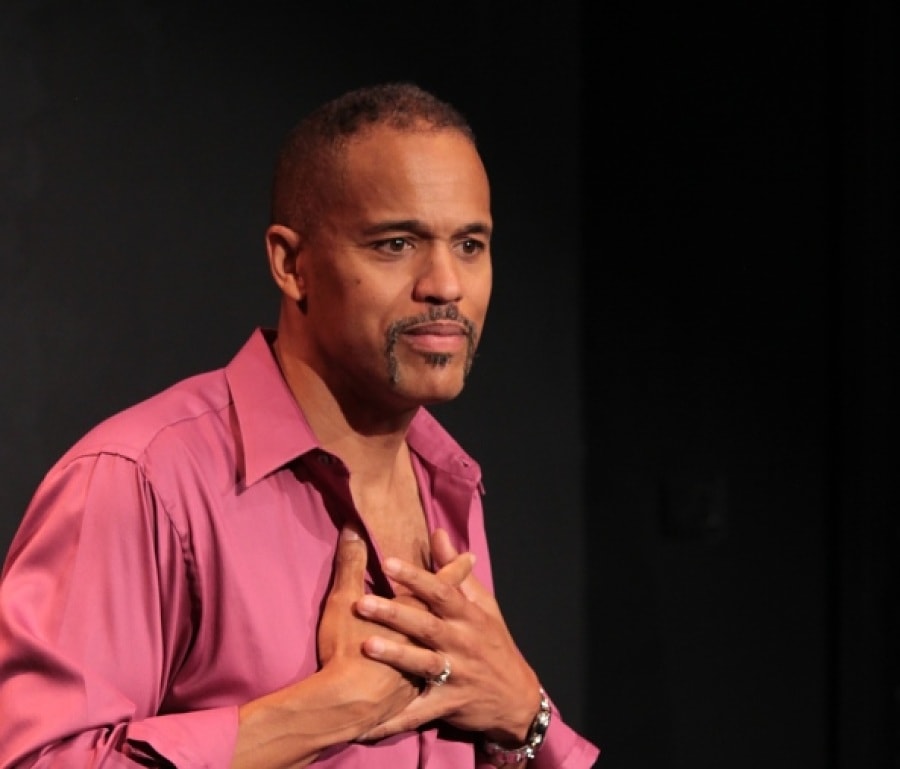NEW YORK CITY: “As a large, black, classically trained actor in America, I’ve auditioned for Othello many times, but I have not played it,” says actor/writer Keith Hamilton Cobb, whose new solo show American Moor, playing April 21–May 10 in a Phoenix Theatre Ensemble production at the Wild Project, is about his struggles to explore the Shakespearean role with an (unseen) white director. “I have been hired to play it a couple of times, and ended up being recast because of what one would call creative differences.”
In American Moor, Cobb enacts his side of a stormy audition for a white director who thinks he knows how a black man should behave, and in doing so, illuminates some of the issues that got him fired from those previous productions. It’s not just that, as Cobb says, Othello usually turns into “the Iago show,” or that it too often seems to simply be repeating “the story of the black man who goes crazy and kills his white girlfriend.” His critique goes deeper: The American theatre, Cobb feels, isn’t designed to support intensive exploration of complicated issues.
“This play is worth doing if you can take the time,” says Cobb, who hails from Tarrytown, N.Y., and studied theatre at NYU’s Tisch School of the Arts. “There’s too much in the play that you cannot serve in the two-and-a-half week, three-week rehearsal process. You have to get in the room and strip yourself naked. Otherwise, why do it again? I’ve seen a lot of productions and I thought they were all horrible. This is a really complex story that we want to see, but we don’t give ourselves time to say, ‘Let’s parse this.’ That’s difficult shit; nobody wants to do that. And nobody can do that in three weeks of rehearsal.”
Of course, there are some who would contend that Othello is an irredeemibly racist work, no matter how carefully it’s parsed—that its portrait of the Other has only so many finer shadings to be filled in. For Cobb, though, that’s all the more reason to spend the time in the room putting the play into conversation with the present.
“Sure, it’s written on purpose to say, ‘That’s what these guys are like,’” Cobb says of Shakespeare’s conception. “At first Othello is debonair, in control, reserved and smart and intelligent—but give him that trigger and it’s all over. Then you watch him for three acts going crazy—I call it the dancing monkey. It was written that way because that’s the story people wanted to see. I don’t suggest it was malicious on Shakespeare’s part; he was a businessman. But we don’t have that excuse.”
The only reason to do the play now, Cobb concludes, it “to find the Moor.” He doesn’t mean a literal 17th-century Muslim, since the term “Moor” was once applied by white Europeans to anyone from North Africa, sub-Saharan Africa or the Middle East. Indeed, Cobb has little interest in academic arguments about what kind of person Shakespeare had in mind exactly. He’s more interested in the way the role has been seen in America; unlike in Europe, where until fairly recently Othello was often played by white actors in blackface, the part has traditionally gone to African-American men, playing opposite white Iagos. And that black/white casting raises issues, Cobb says, that aren’t sufficiently dealt with in most productions.
“My contention has always been, if we’re not doing museum pieces, you have look at the man playing the role here and now, and what does this black man in the room behave like, and how does that inform the role?” Cobb asks rhetorically. He has plenty of ideas of how his presence, size, race and training inform the role, and he lays them out in American Moor.
“When you’re casting a Romeo, you need somebody who can work the verse, but you also basically need a kid—if he can say the words and he’s cute, he’s in,” says Cobb by way of contrast. “But when you’re auditioning an Othello, you have a man in front of you who’s got at least 30 years of doing this. He’s not ready to just do what you say. And if he is, he’s probably not going to be much of an Othello for you.”




